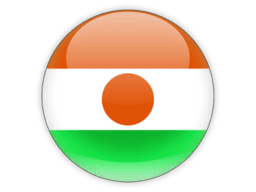
Regions of Niger
Explore 8 regions
Cities of Niger
Discover 50 cities across 8 regions
Agadez(5)
Diffa(3)
Dosso Region(4)
Maradi Region(9)
Niamey(1)
Tahoua Region(10)
Niger is a landlocked country located in West Africa. It is the largest country in West Africa and the 22nd largest in the world. The capital and largest city is Niamey. The official language is French, and the currency is the West African CFA franc.
Niger is a developing country with a population of over 24 million people. The majority of the population is Muslim, and Islam is the dominant religion. Niger is a multi-ethnic country with over 20 ethnic groups, the largest of which are the Hausa, Zarma, and Tuareg.
Niger is known for its vast and beautiful Sahara Desert landscapes, as well as its unique wildlife such as the endangered West African giraffe, dama gazelle, and cheetah. The country is also home to several national parks and reserves, including the W National Park, the Termit and Tin Toumma National Nature Reserve, and the Aïr and Ténéré Natural Reserves.
The economy of Niger is largely based on agriculture, with about 80% of the population engaged in subsistence farming. Major crops grown in Niger include millet, sorghum, cowpeas, and peanuts. Niger also has significant mineral resources, including uranium, coal, and iron ore.
Niger has faced several challenges in recent years, including poverty, food insecurity, and terrorism. The government has been working to address these challenges and has made progress in improving the country's infrastructure and attracting foreign investment. Niger is also a member of several regional and international organizations, including the African Union, the United Nations, and the Economic Community of West African States (ECOWAS).
Telephone Code
227
Local Emergency Phone
199
Vaccinations
An International Certificate of Vaccination for yellow fever is required for all travelers. See WHO recommendations. On 21 March 2022, the US Centers for Disease Control and Prevention (CDC) issued a Travel Alert for polio in Africa; Niger is currently considered a high risk to travelers for polio; the CDC recommends that before any international travel, anyone unvaccinated, incompletely vaccinated, or with an unknown polio vaccination status should complete the routine polio vaccine series; before travel to any high-risk destination, CDC recommends that adults who previously completed the full, routine polio vaccine series receive a single, lifetime booster dose of polio vaccine.
Climate
Varies; equatorial in south, tropical in center, arid in north
Currency (Code)
Communaute Financiere Africaine francs (Western African CFA francs, XOF)
Electricity/Voltage/Plug Type(s)
230 V / 50 Hz / plug types(s): D, G
Major Languages
French, Hausa, Djerma
Major Religions
Muslim 99.3%, Christian 0.3%, animist 0.2%
Potable Water
Opt for bottled water
International Driving Permit
Suggested
Road Driving Side
Right
Tourist Destinations
Zinder; Niamey; Agadez; W Benin-Niger National Park; Ayorou
Major Sports
Soccer, rugby
Cultural Practices
Using the left hand for eating or greeting is considered unclean, use the right hand instead.
Tipping Guidelines
Tipping 10% of the total restaurant bill is appropriate. Tour guides and/or drivers should receive 10% and 5% respectively of the total bill.
Souvenirs
Gold and silver jewelry, leather goods, dyed fabric items, Tuareg native weapons, woven baskets, decorated gourds
Traditional Cuisine
Dambou - rice flour, fine hard wheat semolina (couscous semolina), or millet, wheat or corn couscous; the cereals are steamed for about 20 to 30 minutes and added to boiling moringa leaves; other ingredients are added including onion, chili, salt, broth, peanut, vegetable oil, meat or fish as a side dish
Geography
Area
total: 1.267 million sq km
land: 1,266,700 sq km
water: 300 sq km
Climate
desert; mostly hot, dry, dusty; tropical in extreme south
Natural resources
uranium, coal, iron ore, tin, phosphates, gold, molybdenum, gypsum, salt, petroleum
People and Society
Population
25,396,840 (2023 est.)
Ethnic groups
Hausa 53.1%, Zarma/Songhai 21.2%, Tuareg 11%, Fulani (Peuhl) 6.5%, Kanuri 5.9%, Gurma 0.8%, Arab 0.4%, Tubu 0.4%, other/unavailable 0.9% (2006 est.)
Languages
French (official), Hausa, Djerma
Religions
Muslim 99.3%, Christian 0.3%, animist 0.2%, none 0.1% (2012 est.)
Population growth rate
3.66% (2023 est.)
Government
Government type
semi-presidential republic
Capital
name: Niamey
Economy
Economic overview
low-income Sahel economy; major instability and humanitarian crises limit economic activity; COVID-19 eliminated recent antipoverty gains; economy rebounding since December 2020 Nigerian border reopening and new investments; uranium resource rich
Real GDP (purchasing power parity)
$29.964 billion (2021 est.)
Real GDP per capita
$1,200 (2021 est.)
Agricultural products
millet, cow peas, sorghum, onions, milk, groundnuts, cassava, cabbages, goat milk, fruit
Industries
uranium mining, petroleum, cement, brick, soap, textiles, food processing, chemicals, slaughterhouses
Exports
$1.338 billion (2020 est.)
Exports - partners
United Arab Emirates 54%, China 25%, France 7%, Pakistan 5% (2019)
Exports - commodities
gold, sesame seeds, uranium, natural gas, refined petroleum (2019)
Imports
$3.542 billion (2020 est.)
Imports - partners
China 19%, France 9%, United Arab Emirates 7%, Cote d'Ivoire 6%, India 6%, Nigeria 5%, Togo 5%, Turkey 5% (2019)
Imports - commodities
rice, packaged medicines, palm oil, cars, cement (2019)
International Airports in Niger
Discover 3 major airports serving Niger
Mark Niger as Visited
Add Niger to your personal travel map and track your journey around the world. Share your adventures and see your progress grow!